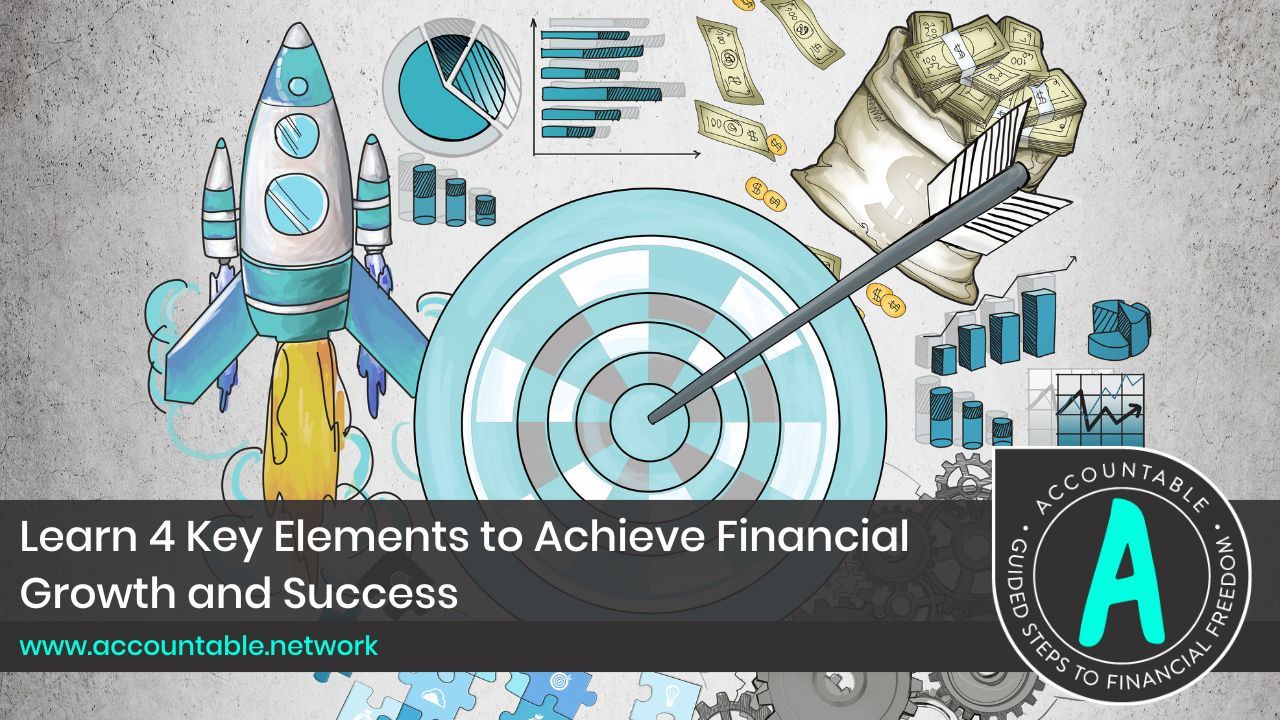Learn Top 5 Financial Management Strategies for a Successful Business

I’ve been in the small business world for a long time—first as a financial advisor, then as a Financial Accountability Coach™, and always as an entrepreneur myself. And if there’s one thing I’ve learned, it’s this: starting a business is exciting, but keeping it profitable and to keep enjoying it is a whole different challenge.
I’ve worked with so many solopreneurs with awesome business ideas. Most if not all of them are passionate, hardworking, and great at what they do… yet struggling behind the scenes when it comes to money. If that’s you, know this—you’re not alone, and you CAN fix it.
Here are the five biggest money struggles I see solopreneurs face (and how to turn things around):
1. Not Paying Yourself a Salary

I can’t tell you how many times I’ve heard: “I’ll pay myself once the business makes more money.”
But here’s the truth: If you don’t start paying yourself now, you probably never will.
I’ve seen solopreneurs work 60+ hours a week and take home $0 because “the b...
Learn How to Declutter Your Money and Reach Your Financial Goals

A fresh start is an opportunity to step back, evaluate your current situation, and refocus on what truly matters. If life feels overwhelming or your finances are spiraling out of control, hitting the reset button is a powerful way to regain clarity and confidence. Here’s how to take a holistic approach to your life while prioritizing your financial well-being:
1. Clear the Clutter

Removing chaos starts with looking at your current situation and cleaning things up.
Start by decluttering your physical and financial environments. In your home, choose a space you use a lot—like your desk or kitchen—and organize it. A clean, functional space fosters focus and calm.
Next, address financial clutter. Review your spending habits, bank statements, and recurring subscriptions. Identify and eliminate unnecessary expenses. Just as tidying a room creates a sense of accomplishment, simplifying your finances brings clarity and control.
2. Create Time for What Matters

Your time and money ...
How to Manage Money When Inflation Causes Grocery Prices to Rise

Picture this — You’re shopping in the grocery store, dropping things into a cart — just the normal stuff: eggs, milk, bread, a couple vegetables, ingredients for that one dinner you know works every time, and a couple pre-made sauces for the work week. You’ve done this before, you know where everything is. In and out, one hour. Reaching the checkout, you’ve managed to beat the rush and find an empty till.
The motion of swiping barcode after barcode is familiar and easy.
The total number staring back at you as you go to pay is not.
What?
Somehow, you’ve busted your budget with the same shopping list you’ve used for the past eight months.
Rushing home, you lug the last of the bags inside and scrounge around for those past receipts. They’ve got to be around here somewhere. Buried in a drawer, you uncrumple the glossy strips and lay them side by side. Ignoring the little treats and special items, you compare the essentials — everything you buy regularly.
Gradually, you notice the chan...
How Christians Can Manage Money and Give Generously Without Stress

Do you ever feel torn between the desire to give generously and the challenge of paying your bills? You’re not alone! You feel called to give as a Christian, but financial stress can make it hard. How can you give without going deeper into debt or feeling anxious about money?
The good news? With the right mindset and biblical principles, you can manage your money wisely and give freely, which will eliminate stress. Let’s explore how faith and smart money habits go hand in hand.
Your Money Mindset: Biblical Foundations of Money Management
Is money truly yours, or does God bless you with it for you to manage? Shifting your mindset to see money as a resource from God can change the way you handle it.
Matthew 6:19–21 reminds us to store up treasures in heaven, not on earth. This means focusing on eternal values rather than financial gains. Giving isn’t just about money; it’s an act of worship and joy.
Luke 6:38 says, “Give and it will be given to you. A good measure, pressed down,...
Learn 4 Key Elements to Achieve Financial Growth and Success

Transformation is a process of continuous improvement, and with the right mindset, tools, and accountability, anything is possible. In Financial Accountability Coaching, this journey can be divided into four distinct phases: Refocus, Gain Control, Plan, and Growth through Accountability. Each phase is unique and essential, working together to create a cycle of continuous improvement and progress.
Refocus: Finding Your Why

The journey starts with refocusing on what really matters to you. This phase is about discovering your "why". It’s about making sure your financial goals match your core values. When your goals match your values, you get a sense of purpose that pushes you forward. Refocusing helps you see clearly and gives you confidence to move ahead.
For example, a family realizes their financial goals don’t match their values of spending more time together. They refocus by choosing to save for family vacations instead of buying luxury items. This change not only aligns thei...
Learn 3 Key Elements that Can Prepare Your Child for Financial Growth

As a parent, teaching your child about money can feel overwhelming. In our blog '7 Effective Ways to Talk to Kids About Money - A Lighthearted Guide,' we covered the basics of starting a healthy financial conversation with your child. Now, it's time to dive deeper into three key areas that can greatly impact their financial growth: Behavior Change, Patience, and Financial Education.
Just like learning to ride a bike, guiding your child toward financial independence is a process filled with practice, encouragement, and sometimes a few falls—each step bringing them closer to mastering the ride.
1. Behavior Change: Laying the Groundwork for Financial Success

When teaching your child about money, actions speak louder than words. Children often learn by watching, and your role as a parent is to guide their financial behaviors through example and gentle correction.
Why Behavior Matters: Your child’s financial habits will shape their future. From spending and saving to managing debt ...
How Can Newlyweds Build Wealth and Achieve Financial Success with Expert Tips?

Congratulations on your marriage! This is an exciting time—a moment filled with love, dreams, and the start of a new life together. While the wedding planning is behind you, another journey is just beginning: building a strong financial foundation for your marriage.
"Marriage is not just a union of hearts, but also a partnership in every aspect of life, including finances. Building a strong financial foundation together can lead to a lifetime of shared success and happiness." — Dr. Emily Stevens, Relationship Expert
Many newlyweds want to have healthy money talks and avoid the financial stress they may have seen in their families. How you handle money together can greatly affect your relationship, from managing day-to-day expenses to reaching your biggest life goals. This blog will guide you through the steps to make sure money strengthens your bond rather than causing tension.
The Four Key Elements to Financial Harmony
1. Healthy Financial Communication

Talking about money c...
Long Term Financial Goals Seem Hard? Tips for Success You Need to Know

Have you ever wondered why it’s tough to reach your financial goals, stick to a budget, or keep up with New Year's resolutions? After helping thousands of clients since 2008, we’ve found a key reason that’s often overlooked: your "why."
The Power of Understanding Your "Why"

Your "why" is the personal reason behind your decisions and actions. It’s what keeps you going, even when things get hard. Without a clear "why," it’s easy to give up on your financial plans. This idea isn’t just about starting strong; it’s about building a foundation for lasting growth and happiness.
Many people struggle to build wealth and happiness because they skip this important step. Goals need more than just good intentions; they need to connect deeply with what really matters to you. When your goals match your values and you know why you want to achieve them, you’re much more likely to succeed.
"Begin with the end in mind. This means to start with a clear understanding of your destination. It means ...
A Captive Insurance Agent or a Broker? What’s the Best Option for You?

When you need insurance for your home or car, you have two main options: working with a captive insurance agent or a broker. Knowing the difference can help you make a smart choice for your needs. In this article, we'll explain each option, show the benefits, and share when and where they might be most useful.
Our Role as Coaches
First, it’s important to know that we are Financial Accountability Coach™ professionals, not insurance agents. We don't sell insurance or tell you what coverage to get. However, we do believe that insurance is a big part of keeping your money safe. We aim to make these ideas easier to understand, but you should always talk to a licensed insurance agent to find what’s best for you.
What is a Captive Insurance Agent?

Captive insurance agents work for just one insurance company and can only sell that company’s products. These agents often know their company’s products really well and can give you personal advice. Companies like Allstate and State Farm ar...
Discover Expert Tips for Insurance Quoting and Learn How to Save Money

Why Quoting Insurance Matters?
Getting quotes for your car (auto) and homeowners (or renter’s) insurance is a simple step that can lead to significant financial savings. As Financial Accountability Coach™ coaches, we’ve seen how taking a few minutes to get quotes can make a big difference in your financial health. This blog offers practical tips to help you secure the best coverage at competitive rates.

Insurance is a key part of your financial safety net. It helps manage risk and protect your assets. While it may not always be top of mind, regularly quoting your insurance ensures you’re not overpaying on premiums and that you’re properly covered as your life changes.
Understanding Your Options
When it comes to insurance, there are two main types of providers: Captive Insurance Agents and Brokers. We have a detailed overview of the differences in this blog "A Captive Insurance Agent or a Broker? What’s the Best Option for You?" but in a nutshell…
- Captive Insurance Agents re ...
